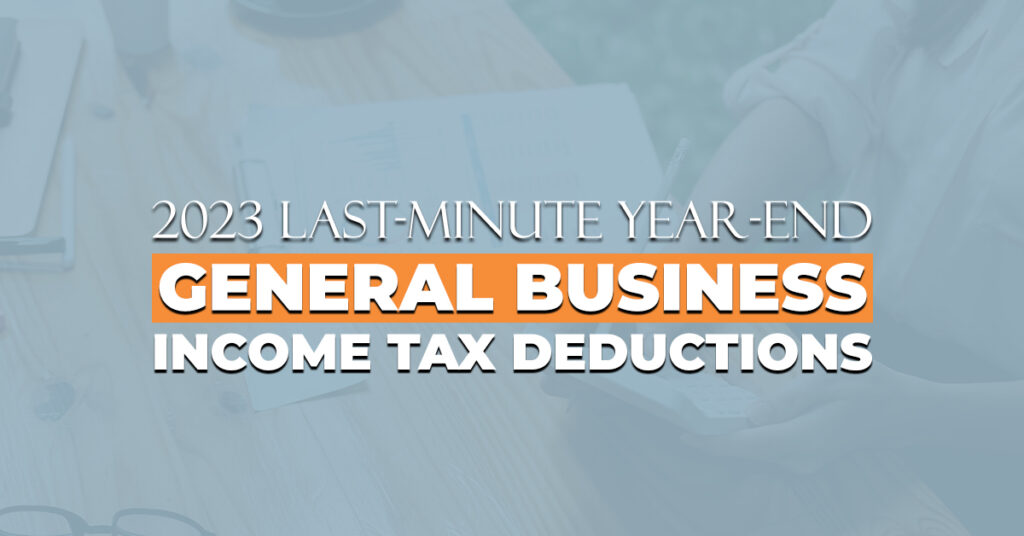2023 Last-Minute Year-End General Business Income Tax Deductions

2023 Last-Minute Year-End General Business Income Tax Deductions
There’s nothing better than getting a tax refund from the IRS when tax season comes. Of course, there are many moving parts to tax filing that can make it tricky to ensure you’re getting all the money owed to you by the government. If you want to ensure you get your maximum refund or pay as little as possible this tax season, keep reading for some last-minute business tax deductions that can help.
1. Prepay Expenses Using the IRS Safe Harbor
IRS regulations contain a safe-harbor rule that allows cash-basis taxpayers to prepay and deduct qualifying expenses up to 12 months in advance without challenge, adjustment, or change by the IRS. For a cash-basis taxpayer, qualifying expenses include lease payments on business vehicles, rent payments on offices and machinery, business and malpractice insurance premiums, and others.
Before sending a full year of rent to your landlord, ensure he understands the strategy behind it. Otherwise, he may think you made a mistake and return the payment to you, removing your chances of receiving this tax deduction for 2023.
Send the check using one of the U.S. Postal Service tracking delivery methods, such as priority mail, with tracking so you have proof of the date you mailed the rent check. You can even require a signature to prove the landlord received the check. Make sure to print the delivery and receipt tracking results for your tax records because that information disappears from the postal service records long before you need it for the IRS.
Under current tax rules, you won’t include the December 31 payment on the Form 1099 you give your landlord because it would be incorrect reporting. To get the 1099 right for you, the landlord, and the IRS, see Avoid IRS Audits: Fix the 1099 Prepaid-Rent Mismatch.
2. Stop Billing Customers, Clients, and Patients
Here is one easy strategy to reduce your taxable income for this year: if you’re on a cash basis and operating on the calendar year, stop billing your customers, clients, and patients until after December 31, 2023. Customers, clients, patients, and insurance companies generally don’t pay until billed, so this strategy will keep most payments from coming in until the new year begins.
3. Buy Office Equipment
Qualifying Section 179 and bonus depreciation purchases include new and used personal property such as machinery, equipment, computers, desks, furniture, chairs, and certain qualifying vehicles. You can likely use Section 179 to deduct 100 percent of the cost of this equipment. Alternatively, bonus depreciation would give you an 80 percent deduction plus a five to 20 percent MACRS depreciation deduction.
Remember, if you qualify for the Section 199A deduction, the increased expenses will reduce your deduction, as explained in the 2023 Last-Minute Section 199A Tax Reduction Strategies.
4. Use Your Credit Cards Correctly
If you are a single-member LLC or sole proprietor filing Schedule C for your business, the day you charge a purchase to your business or personal credit card is the day you deduct the expense. Therefore, you should consider using your credit cards for last-minute purchases of office supplies and other business necessities. The same rule applies if you operate your business as a corporation and the corporation has a credit card in the corporate name.
Suppose you operate your business as a corporation and are the personal owner of the credit card. In that case, the corporation must reimburse you if you want the tax deduction, which happens on the reimbursement date. Submit your expense report and have your corporation reimburse you before midnight on December 31.
5. Don’t Assume You Are Taking Too Many Deductions
You should never stop documenting your deductions and always claim all your rightful deductions. We have spoken with far too many business owners, especially new owners, who don’t claim all their deductions when those deductions would produce a tax loss.
But this won’t happen to you because, as a subscriber, you know all deductions are valuable. You also know you must claim all your deductions to keep your taxes to their rightful amount. If your business deductions exceed your business income, you have a tax loss for the year. With a few modifications to the loss, tax law calls this a “net operating loss,” or NOL.
If you are just starting your business or have faced many challenges this year, you may have an NOL. The good news is that NOLs can become future cash infusions for your business because you carry 2023 NOLs forward to the coming years.
6. Deal with Your Qualified Improvement Property (QIP)
QIP is any improvement you make to the interior portion of a building you own that is non-residential real property (office buildings, retail stores, and shopping centers) if you place the improvement after the date the building was first established in service.
The big deal with QIP is that it’s not considered real property that you depreciate over the years. QIP is a 15-year property eligible for immediate deduction using Section 179 expensing, an 80 percent bonus, and MACRS depreciation. To get the QIP deduction in 2023, you must place the QIP in service on or before December 31, 2023.
If you placed QIP in service in 2020 and did not amend your 2020 tax return, you have some work to do because that QIP is no longer a 39-year property. It is a 15-year property and requires the 2020 100 percent bonus depreciation deduction if you don’t elect out of bonus depreciation. For what’s needed, see CARES Act Fixes TCJA Glitch on QIP, Requires Action.
Final Thoughts
When it comes to your taxes, business deductions are king. The more business deductions you can claim, the better. The more business deductions you claim, the less you pay in regular taxes. And if you are self-employed, you’ll pay less in self-employment taxes. No one likes paying a lot in taxes, so it’s well worth the time you invest into these deductions to lower your tax bill or raise your refund amount when Tax Day arrives.






